|
|
|
Sort Order |
|
|
|
Items / Page
|
|
|
|
|
|
|
| Srl | Item |
| 1 |
ID:
188230


|
|
|
|
|
| Summary/Abstract |
Many Arab Americans cheered Lieutenant Filastine Srour’s promotion to the rank of captain in the New York City Police Department as if this constituted a collective victory for Palestinians. But one person rising up in a notoriously racist institution does not end their community’s criminalization. Nor is individual advancement by a woman a feminist accomplishment, as feminism aspires to dismantle oppressive systems, not succeed in them.
|
|
|
|
|
|
|
|
|
|
|
|
|
|
|
|
| 2 |
ID:
188227
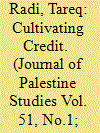

|
|
|
|
|
| Summary/Abstract |
Since 2007, the Palestinian Authority has implemented a strategy of financialized urbanization in response to economic crises precipitated by Israel’s settler-colonial stranglehold on the Palestinian economy. This article argues that financialized urbanization operates as a mechanism to expand the local banking sector and as a modality of settler-colonial alienation. Examining the joint-ownership structures of companies whose activities straddle real estate and financial markets, the article shows where land ownership in the West Bank ultimately lies. The study highlights qualitative changes in money lending and the extended reach of finance to emphasize the risks of financial collapse. Understanding finance capital and settler colonialism as systems predicated on managing risk for maximum returns, the discussion draws their relation to each other into a single analytical framework to center the question of land dispossession and racialization at the heart of financialized urbanization.
|
|
|
|
|
|
|
|
|
|
|
|
|
|
|
|
| 3 |
ID:
189544
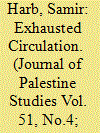

|
|
|
|
|
| Summary/Abstract |
This article looks at cement as a vital material in the process of urbanization. It specifically addresses urban metabolism, examining the intricacies of the cement circulation network in the occupied Palestinian territories (oPt) during the post-Oslo period. Because of Israel’s near-total control of land and natural resources in the oPt, there is still no fully integrated Palestinian cement plant there, making the Palestinian construction sector highly dependent on imports from Israel’s Nesher cement factory. This article argues that controlling the circulation of cement constitutes sovereignty over the processes of urbanization. In the current context, the cement circulation system that is effectively controlled by Israel is characterized by exhaustion, resulting in Palestinian urban geography’s perennial metabolic insufficiency.
|
|
|
|
|
|
|
|
|
|
|
|
|
|
|
|
| 4 |
ID:
188229


|
|
|
|
|
| Summary/Abstract |
This essay is a translated and edited version of the Anis Makdisi Program in Literature lecture delivered by the author in May 2021. The talk, on the uprising sweeping every Palestinian geography from the river to the sea, was constructed as a series of illustrative stories. Their distillation, as Khoury points out, is that there will be no end to the Palestinian question so long as there exists a people continually prepared to resist the ongoing Nakba. “It is enough,” Khoury concludes, “that with this uprising Palestine has recovered the alphabet, leaving us to create a new idiom.”
|
|
|
|
|
|
|
|
|
|
|
|
|
|
|
|
| 5 |
ID:
189541
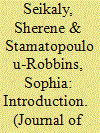

|
|
|
|
|
| Summary/Abstract |
The Journal of Palestine Studies’ special issue on infrastructure, environment, and health in Palestine sheds new light on the conditions and possibilities of politics. Although it is commonly viewed as “an entity ostensibly separate from technology and other human constructions,” the environment is in fact a particular configuration of “socio-technical arrangements.” The special issue’s four articles and two reflection essays—by Nadi Abusaada, Leena Dallasheh, Samir Harb, Cristina Violante, Nimrod Ben Zeev, and Emily McKee—span historical periods from Ottoman-ruled Palestine to the contemporary era. Hailing from the fields of history, architecture, anthropology, and legal theory, the contributors draw on original archival, spatial, and ethnographic research to parse the realities, experiences, and lessons that Palestine offers beyond its status as a site of settler-colonial deprivation and toxicity. Together they demonstrate that infrastructure, environment, and health are fundamentally and irrefutably political.
|
|
|
|
|
|
|
|
|
|
|
|
|
|
|
|
| 6 |
ID:
188231
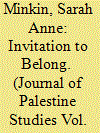

|
|
|
|
|
| Summary/Abstract |
This essay takes as its starting place the “present absentee” status of Palestinians in U.S. and Jewish discourse and engagement with Israel/Palestine. Ethnographic fieldwork in Jewish American communities demonstrates practices that reiterate a dynamic of Jewish belonging against the presence of Palestinian absence. The essay explores different initiatives to challenge this systemic exclusion of Palestinians, including public programs that amplify Palestinian voices and normalize hearing Palestinians as experts in their own lives and an experimental study group with Jewish American leaders that centers Palestinian perspectives in an effort to cultivate radical empathy. Insights gained in these initiatives point to the importance of articulating fuller visions of community and belonging in engagement with Israel/Palestine.
|
|
|
|
|
|
|
|
|
|
|
|
|
|
|
|
| 7 |
ID:
188233
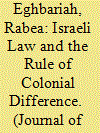

|
|
|
|
|
| Summary/Abstract |
Israeli law is an important medium that maintains, perfects, and facilitates the fragmentation of Palestinians. Israeli citizenship figures in this structure of fragmentation as an exceptionalizing legal status that blurs “colonial difference” between Palestinian citizens in Israel and Jewish Israelis. The May 2021 uprising and its aftermath not only highlighted the counter-fragmentary forces present among Palestinians across different legal statuses, it also brought into clearer view a rule of “colonial difference” that crisscrosses the Israeli legal system and pertains to all Palestinians under its control. This essay explores the concept of “colonial difference” as applied to Palestinians through the law, and how this rule has been employed in the context of the May 2021 uprising against Palestinian citizens in particular.
|
|
|
|
|
|
|
|
|
|
|
|
|
|
|
|
| 8 |
ID:
188228


|
|
|
|
|
| Summary/Abstract |
This article maps the internationalization of the Palestinian cause by studying the participants, groups, and themes at Palestinian solidarity conferences held in 1969–70. Examining such conferences reveals the extent of communication and ideological debate between the Palestine Liberation Organization (PLO) and international solidarity activists at an important juncture in the internationalization of the Palestinian liberation movement. The article makes the methodological point that international conferences organized by the PLO and other Palestinian institutions can function as an alternative archive that complements the traditional archives of diplomatic and intellectual history. Read in tandem with extant Palestinian sources, the paper trail left by international conferences mitigates the scattered and precarious status of Palestinian archives.
|
|
|
|
|
|
|
|
|
|
|
|
|
|
|
|
| 9 |
ID:
189542
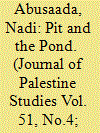

|
|
|
|
|
| Summary/Abstract |
The rationalization of urban water-supply systems and networks was a pressing concern in the development of modern cities globally in the late nineteenth and early twentieth centuries. The rise of the modern city did not manifest only in the complete overhaul of water and sewage infrastructures but also in the creation of new mechanisms of urban governance to manage them. Examining understudied municipal water projects in Jaffa and Nablus, two chief centers of light industry in the late Ottoman and Mandate eras, this paper provides an analysis of the historical relationship between urban governance and urban infrastructures in modern Palestine. It investigates the involvement of Palestinian urbanites in the debates over municipal water projects in their cities, demonstrating that these constituted more than merely utilitarian instruments and were foundational to the articulation of urban rights in modern Palestine.
|
|
|
|
|
|
|
|
|
|
|
|
|
|
|
|
| 10 |
ID:
189545
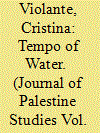

|
|
|
|
|
| Summary/Abstract |
During the Mandate period, Palestinian rural communities often shared their water sources proportionally in time-based rotations. Water use functioned as a temporal marker, embedded in the tempo of daily life. This article contrasts this way of distributing water with that of Zionist settlers and the British Mandatory administration, which typically measured water use in terms of volume. Volume-based measures, used by the British and by Zionist settlers, facilitated the commodification of water, transforming it into an object of investment for the development of colonial infrastructure, most notably irrigation and electricity. Time-based rotations, in contrast, were anchored in the movement of the sun and planets, seasonality (dry vs. wet season), and the needs of the community as a whole. The two approaches reflect different ways of relating to the environment and the natural world. Therefore, Zionist dispossession of water resources was not merely material, but it disrupted communal practices and obscured their associated temporalities.
|
|
|
|
|
|
|
|
|
|
|
|
|
|
|
|
| 11 |
ID:
189546
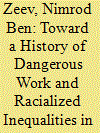

|
|
|
|
|
| Summary/Abstract |
In recent years, a high number of fatal work accidents in the construction industry in Palestine/Israel has led several Israeli civil society organizations to begin documenting and publicizing the details of work accidents and identities of the victims. This novel documentation work has laid bare the unequal racialized distribution of dangerous work and bodily harm in the land. Palestinian construction workers from across the Green Line consistently constitute the overwhelming majority of victims of construction accidents, followed by migrant workers. Considering the long history of racial divisions of labor in Israel/Palestine over the last century, and building on the insights of scholarship on disability and political economy, this essay argues for the historical study of dangerous work as a crucial field of inquiry for scholars seeking to understand inequality, exploitation, the production of difference, settler colonialism, and communities’ experiences of these phenomena and processes in Palestine/Israel since the early twentieth century.
|
|
|
|
|
|
|
|
|
|
|
|
|
|
|
|
| 12 |
ID:
189547


|
|
|
|
|
| Summary/Abstract |
Expanding on political ecology analyses that are increasingly applied to water-related challenges, this essay calls for greater attention to the political and social consequences of proposed water solutions. Concern about environmental health in Palestine often highlights a lack of water access, with proposed solutions focusing on increasing water supplies. Drawing on fieldwork in the West Bank, northern Israel, and Tel Aviv, this essay compares how differently situated residents and water managers evaluate the potential impacts of one type of supply-side infrastructure: desalination. This comparison counters avowedly apolitical technical evaluations of such initiatives by showing uneven sociopolitical costs and benefits.
|
|
|
|
|
|
|
|
|
|
|
|
|
|
|
|
| 13 |
ID:
188232


|
|
|
|
|
| Summary/Abstract |
This essay considers the place of the Gaza Strip in the broader Palestinian context. Israel’s determination to separate Gaza from the West Bank since the signing of the Oslo Accords and its subsequent withdrawal from the territory in 2005 resulted in a process that culminated in the buildup of a Palestinian military front reminiscent of that established by the Palestine Liberation Organization in south Lebanon in 1975–82. In both instances, the military front appears to serve as a Palestinian counterstrategy to achieve linkage. Palestinians demonstrated their determination to break the isolation of Gaza in the war of May 2021 that was accompanied by mass mobilization across and outside Mandate Palestine. The essay probes the question of whether we are witnessing the consolidation of a Gazan military front and points to the minimal political conditions necessary for such a development to advance the liberation struggle.
|
|
|
|
|
|
|
|
|
|
|
|
|
|
|
|
| 14 |
ID:
189543


|
|
|
|
|
| Summary/Abstract |
This article explores the appeals for aid made by Nazareth’s inhabitants to the US Point Four Program (the predecessor to today’s USAID) to implement a water infrastructure project during the early 1950s. It argues that this was one of several attempts by Palestinians to push back against their exclusion and marginalization by the nascent Israeli state and to retain some measure of autonomy in local governance. Focusing on this settler-colonial setting, and on the role of nonstate actors in what became a protracted and complex conflict, I show how water rights and resource management were embroiled in the political contests that shaped the process of decolonization, at both local and international levels.
|
|
|
|
|
|
|
|
|
|
|
|
|
|
|
|
|
|
|
|
|